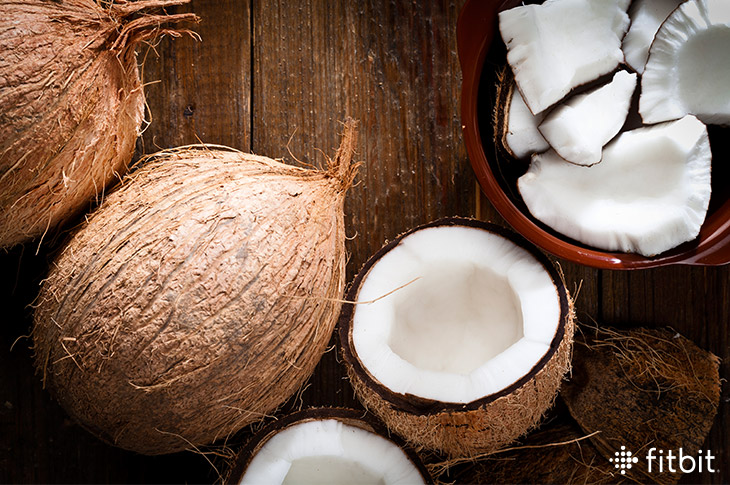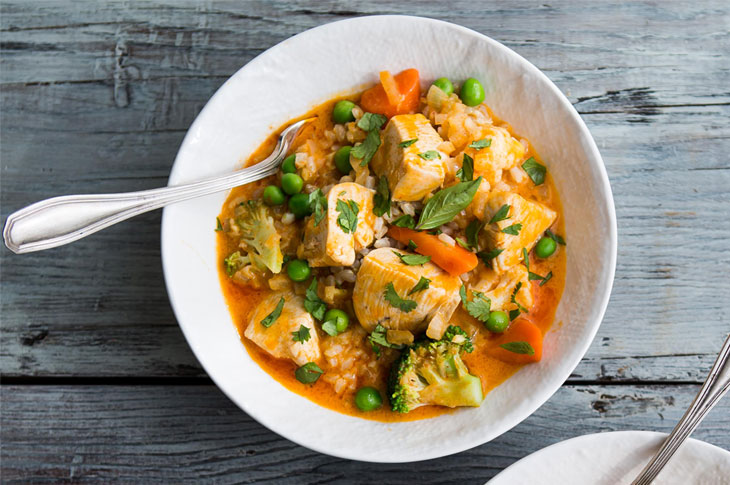
Topping all of the healthy eating trends for 2016, everyone seems to be nuts for coconuts. People are using coconut water to recover from a workout, Gwyneth Paltrow adds a spoonful of coconut oil to her morning smoothie, and Starbucks put a coconut milk latte on the menu. You can now munch on coconut in potato-chip form, or enjoy it in paleo-friendly protein bars and bites. From the dried flakes to the extracted oil, it’s in countless products, touting it for being naturally vegan, gluten-free, and—debatably—rich in healthy fats.
Is Coconut as Healthy as It’s Cracked Up to Be?
It depends what kind of coconut you’re munching! The fresh fruit is full of fiber, vitamins, and nutrients. But not many Americans are lucky enough to enjoy the wiggly, jiggly flesh of the young, green fruit. Coconut water is high in potassium and low in sodium, so it will hydrate you after a workout, but it doesn’t have enough sodium to replace a sports drink. Coconut flakes offer some fiber, which is positive, so long as you’re skipping the super sweetened versions. But once you start digging into the dried flesh, and all of the products derived from it—milk, cream, oil, and butter—you’ll discover high calorie counts and a surprising amount of saturated fat.
The Controversy over Coconut Oil
The craze started in the beauty aisle, with moisturizing products for skin, nails, and hair. But coconut oil is now an ultra cool ingredient, used to dress salads, sizzle stir-fries, and make popcorn. Some health nuts are even drizzling it in their coffee and smoothies. The super fans point to research showing the fat can raise good cholesterol levels (HDL), be metabolized quickly, and supports fitness and weight loss. But it has also been shown to raise bad cholesterol levels (LDL), and the American Heart Association continues to be cautious about saturated fat. For now, you might want to use it sparingly and stick with extra-virgin olive oil and avocado oil for everyday cooking needs.
Cooking with the Whole Coconut
But coconut—the whole coconut!—has a long and tasty culinary tradition in Southeast Asia, and there’s way more to love about this fruit than just one refined product. It’s creamy and delicious, versatile from savory to sweet, and yes, an option if you’re gluten- or dairy-free. Plus, Hawaiian cuisine is totally happening right now, and what would tiki drinks, chicken curry, or butter mochi cake be without it?! Here are a few of our favorite ways to work with coconut—that you can genuinely consider healthy.
Toasty granola: ¼ cup (½ oz/15 g) of unsweetened coconut flakes provide 8 percent of your daily fiber. Toss them with oats and seeds and toast until golden and fragrant. Sprinkle granola over your Greek yogurt in the morning, and pile on fresh blueberries.
Tropical smoothies: 1 cup (8 fl oz/250 ml) unsweetened coconut water serves up 12 percent of your daily potassium needs, and only about 2 teaspoons of sugar. Use it as the liquid to loosen your morning drink, and jam in sunny fruit, like mango and pineapple. Plus, it’s the classic choice for a cool blue açai bowl.
Fragrant soups & spicy curries: Coconut milk is a pretty lightly processed food, made from grating the flesh, combining it with water, and then straining. The result is incredibly rich and creamy, but can pack calories and fat. But you don’t need to tip in a whole can, and you can substitute lite coconut milk, which brings the flavor at a third of the fat. Use it to enrich Thai soups, filled with seafood and veggies, or Indian curries, featuring tender chicken and dark greens.
Creamy coconut rice: Coconut milk makes a pot of rice irresistibly sticky and sweet. Start with short-grain brown rice, and substitute 1 cup (8 fl oz/250 ml) of lite coconut milk for part of the cooking liquid. Add a couple of slices of raw ginger or a few cardamom pods, and you’ll release amazing aromas when you lift the lid.
Sweet treats: Coconut milk is a great non-dairy option for vegans, so long as you keep in mind that it’s higher in calories and fat than other types of milk, like almond and soy. Save it for special occasions and sweet treats, like ice cream, popsicles, and pudding.
Baking swaps: Coconut flour is an intriguing alternative for gluten-free bakers. 2 tablespoons provides 5 g of fiber, 21 percent of your daily value! But again, look out for that fat. Coconut sugar also has a lower glycemic index than refined white sugar, if you’re into alternative sweeteners.

Hungry for more? Check out these easy and delicious Red Curry Bowls with Chicken & Veggies, from The Whole Coconut Cookbook.
This information is for educational purposes only and is not intended as a substitute for medical diagnosis or treatment. You should not use this information to diagnose or treat a health problem or condition. Always check with your doctor before changing your diet, altering your sleep habits, taking supplements, or starting a new fitness routine.

If you have questions about a Fitbit tracker, product availability, or the status of your order, contact our Support Team or search the Fitbit Community for answers.
Please note: Comments are moderated and may not appear immediately after submission.